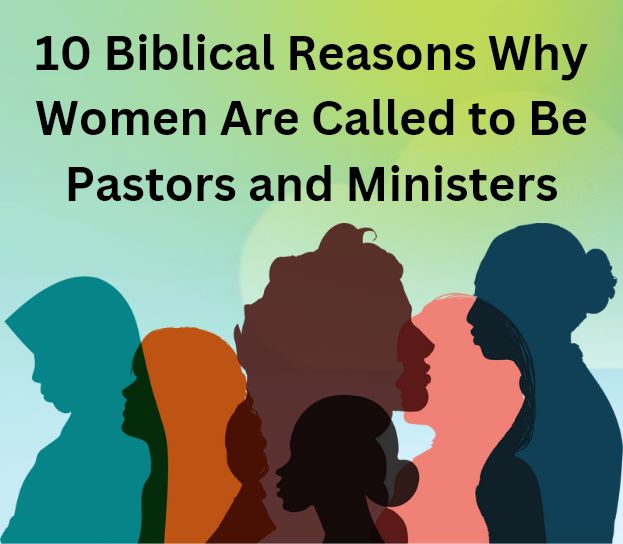POSTED | March 25, 2023 - Rev. Gordon Williams
10 Biblical Reasons Why Women Are Called to Be Pastors and Ministers
Old and New Testament Women in Ministry
 Canada is not alone in its heated debate over women's participation in religious leadership. I believe it to be one of the most misused, misinterpreted, and controversial issues in the church.
Canada is not alone in its heated debate over women's participation in religious leadership. I believe it to be one of the most misused, misinterpreted, and controversial issues in the church.
In 2011, Statistics Canada published an online report stating the “Population by Religion and Sex”. Table 9's first grouping shows that 69.5% of the 11,605,000 female respondents identified as Christians. Similarly, 64.9% of 10,497.8 males reported being Christian. (1)
According to the 2011 census, modified in 2015, there are equally if not more female Christians than male. Is it not wrong for such a large portion of the church to not teach or preach the Word of God? If so, then we need to rethink how we go about reaching people for Christ.
The false doctrine that women are not qualified to teach must be refuted for the sake of the church. Let's check the Bible for some answers.
Both the Old and New Testaments feature Women in Ministry Roles:
1. Women are used by God in Old Testament days as prophetesses (Ex. 15:20; Judges 4:4; 2 Kings 22: 14;2 Chron. 34:22; Neh. 6:14; Is. 8:3) and in the New Testament (Lk. 1:3-59; 2:36). The law made provision for women to make sacrifices, attend feasts and make vows (Deut. 12:11-18; Lev. 27).
God used a rod (Ex. 4:2,17); a talking donkey (Num. 22:28); a ram’s horn (Josh. 6:5); ox goad, nail, barley cake, pitchers, jawbone, millstone (Judges 3: 31; 4:21; 7:13, 20; 9:53; 15:15-19) mantle (2 Kings 2:8), ditches (2 Kings 3:16); empty vessels (2 Kings 4:3); cruise of oil, ravens (1 Kings 17:4, 16); worm, wing, fish, gourd (Jonah 1:4, 17, 4:6-7); cock (Mk. 14:72); and many other weak things to confound the mighty (1 Cor. 18:21). He used men, so why can't He also use women?
2. In the Gospels we read of several women messengers who proclaimed “good news’ (Matt. 28:1-10; Lk. 24:9-11; Jn. 4:20-20; 20: 16-18).
3. In Acts 2:14-21 and Joel 2:28-31 God predicted and promised that He Himself would pour out His Spirit upon women and they would prophesy. To prophesy means to “speak to men to edification, exhortation and comfort” (1 Cor. 14:3). “He that prophesieth edifieth the church” (1 Cor. 14:4). Prophesying is for the church and general public (1 Cor. 12:1-31; 14:1-6, 12, 14-25, 29-33)
4. In the Upper Room there were both men and women who received the Baptism of the Holy Spirit and who went out into the streets of Jerusalem speaking in tongues (other languages) “telling the people in their own tongues the mighty works of God” (Acts 2:1-13). As a result, 3000 were converted and received the Holy Spirit's Baptism (Acts 2:38, 41), and this number eventually reached 5000 (Acts 4:4).
5. As seen in Acts 21:8-9, all four of Phillip's daughters followed in their father's footsteps as evangelists, or prophetesses. This lines up perfectly with the early church's fulfilment of Joel 2:28-29 and Acts 2:16 and the latter-day fulfilment of Acts 2:17-18.
Acts 2:16-18: “But this is what was spoken by the prophet Joel: 'And it shall come to pass in the last days, says God, That I will pour out of My Spirit on all flesh; Your sons and your daughters shall prophesy, Your young men shall see visions, Your old men shall dream dreams.”
6. A record number of women served the Lord in different capacities. In Romans 16, Phoebe (vs. 1-2), Priscilla (vs. 3-5), Mary, Tryphena, Tryphosa, and Persis. Andronicus's wife Junias and the apostle Junias were both imprisoned at the same time (vs. 16:7). Lydia, a seller of purple, invited Paul and Luke to stay in her house in Acts 16:14.
8. Paul calls Eudias and Syntyche "labourers of the Church of Philippi" in Philippians 4:12.
9. Women of Corinth prayed and prophesied in the Church (1 Cor. 11:4-5). Despite the scripture’s use to condemn female preachers, 1 Corinthians 14:34-35 does not address preaching but rather the disruption of worship services by wives who "ask or talk out to their husbands in church." Because it instructs wives to "ask their husbands," we know that this is meant to be taken as a reference to married women. Therefore, we can presume that it is only referring to married women and not all women.
In order to rightly divide this scripture, you need to take into account the culture that existed during the time period in question. Women did not enjoy the same rights and privileges as men. They were examples of second-class citizens. In public settings, men and women were not permitted to sit together. The husbands would sit on one side of the synagogue, while their wives would sit on the opposite side.
The only means by which the women could acquire an education about the sermon were through their husbands. When the women didn't comprehend what was being said during their gatherings in the synagogues, they would address their husbands by asking them questions about the message. You can probably imagine how this added to the overall feeling of confusion and distraction that was caused by women speaking out during the church service. It was disruptive.
Paul was not speaking about the doctrine of the church; rather, he was addressing a matter of church order. He instructed the women that if they wanted to learn anything, they should ask these questions to their husbands when they were at home. Because of this, Paul said that it was inappropriate for women to speak in the church. They were making it difficult to follow the prescribed order of the service.
Because just a few chapters earlier in 1 Corinthians 11:5, Paul is talking about women praying or prophesying in the church, it is abundantly clear that he is not referring to the idea that women should not teach. Why would Paul later contradict himself by claiming that women are incapable of teaching? It doesn't make sense.
9. Even so, in 1 Timothy 2:11-15, Paul does not condemn female preachers as long as they do not "usurp authority over man." Both men and women were permitted to pray and prophesy in Corinth, but they were subject to strict rules (1 Cor. 14:24-32).
The woman is told not to usurp authority over her husband. The word "usurp" means: to act of oneself; to dominate. A woman should not teach, advise or overpower her husband. It refers to wives being submissive to their husbands. See "Is the Husband the Head of the Household?"
10. Paul compares the church to the human body in Romans 12:6-8 and 1 Corinthians 12:8-10, and mentions the 15 Gifts of the Holy Spirit, including prophecy, for ALL members of the body of Christ: men and women (Gal. 3:28).
As you can see by reviewing the "10 Biblical Reasons Why Women Are Called To Be Pastors And Ministers," women are truly called by God to serve in ministry and preach His Word in the church. It would be impossible to maintain any false belief that forbids women from teaching after viewing all the scriptures that show women serving in a variety of ministry roles.
Matthew 28:19-20: “Therefore go and make disciples of all nations, baptizing them in the name of the Father and of the Son and of the Holy Spirit, and teaching them to obey everything I have commanded you. And surely I am with you always, to the very end of the age.”
(1) Source: Statistics Canada, National Household Survey, 2011. Modified on 2015-11-30.
 Canada is not alone in its heated debate over women's participation in religious leadership. I believe it to be one of the most misused, misinterpreted, and controversial issues in the church.
Canada is not alone in its heated debate over women's participation in religious leadership. I believe it to be one of the most misused, misinterpreted, and controversial issues in the church. Many churches have a strict policy against allowing women to teach or preach. Some churches only allow women to teach if they teach children or other women. The extent to which women are permitted to preach varies widely among Christian denominations.
In 2011, Statistics Canada published an online report stating the “Population by Religion and Sex”. Table 9's first grouping shows that 69.5% of the 11,605,000 female respondents identified as Christians. Similarly, 64.9% of 10,497.8 males reported being Christian. (1)
According to the 2011 census, modified in 2015, there are equally if not more female Christians than male. Is it not wrong for such a large portion of the church to not teach or preach the Word of God? If so, then we need to rethink how we go about reaching people for Christ.
The false doctrine that women are not qualified to teach must be refuted for the sake of the church. Let's check the Bible for some answers.
Both the Old and New Testaments feature Women in Ministry Roles:
1. Women are used by God in Old Testament days as prophetesses (Ex. 15:20; Judges 4:4; 2 Kings 22: 14;2 Chron. 34:22; Neh. 6:14; Is. 8:3) and in the New Testament (Lk. 1:3-59; 2:36). The law made provision for women to make sacrifices, attend feasts and make vows (Deut. 12:11-18; Lev. 27).
God used a rod (Ex. 4:2,17); a talking donkey (Num. 22:28); a ram’s horn (Josh. 6:5); ox goad, nail, barley cake, pitchers, jawbone, millstone (Judges 3: 31; 4:21; 7:13, 20; 9:53; 15:15-19) mantle (2 Kings 2:8), ditches (2 Kings 3:16); empty vessels (2 Kings 4:3); cruise of oil, ravens (1 Kings 17:4, 16); worm, wing, fish, gourd (Jonah 1:4, 17, 4:6-7); cock (Mk. 14:72); and many other weak things to confound the mighty (1 Cor. 18:21). He used men, so why can't He also use women?
2. In the Gospels we read of several women messengers who proclaimed “good news’ (Matt. 28:1-10; Lk. 24:9-11; Jn. 4:20-20; 20: 16-18).
3. In Acts 2:14-21 and Joel 2:28-31 God predicted and promised that He Himself would pour out His Spirit upon women and they would prophesy. To prophesy means to “speak to men to edification, exhortation and comfort” (1 Cor. 14:3). “He that prophesieth edifieth the church” (1 Cor. 14:4). Prophesying is for the church and general public (1 Cor. 12:1-31; 14:1-6, 12, 14-25, 29-33)
4. In the Upper Room there were both men and women who received the Baptism of the Holy Spirit and who went out into the streets of Jerusalem speaking in tongues (other languages) “telling the people in their own tongues the mighty works of God” (Acts 2:1-13). As a result, 3000 were converted and received the Holy Spirit's Baptism (Acts 2:38, 41), and this number eventually reached 5000 (Acts 4:4).
5. As seen in Acts 21:8-9, all four of Phillip's daughters followed in their father's footsteps as evangelists, or prophetesses. This lines up perfectly with the early church's fulfilment of Joel 2:28-29 and Acts 2:16 and the latter-day fulfilment of Acts 2:17-18.
Acts 2:16-18: “But this is what was spoken by the prophet Joel: 'And it shall come to pass in the last days, says God, That I will pour out of My Spirit on all flesh; Your sons and your daughters shall prophesy, Your young men shall see visions, Your old men shall dream dreams.”
6. A record number of women served the Lord in different capacities. In Romans 16, Phoebe (vs. 1-2), Priscilla (vs. 3-5), Mary, Tryphena, Tryphosa, and Persis. Andronicus's wife Junias and the apostle Junias were both imprisoned at the same time (vs. 16:7). Lydia, a seller of purple, invited Paul and Luke to stay in her house in Acts 16:14.
8. Paul calls Eudias and Syntyche "labourers of the Church of Philippi" in Philippians 4:12.
9. Women of Corinth prayed and prophesied in the Church (1 Cor. 11:4-5). Despite the scripture’s use to condemn female preachers, 1 Corinthians 14:34-35 does not address preaching but rather the disruption of worship services by wives who "ask or talk out to their husbands in church." Because it instructs wives to "ask their husbands," we know that this is meant to be taken as a reference to married women. Therefore, we can presume that it is only referring to married women and not all women.
In order to rightly divide this scripture, you need to take into account the culture that existed during the time period in question. Women did not enjoy the same rights and privileges as men. They were examples of second-class citizens. In public settings, men and women were not permitted to sit together. The husbands would sit on one side of the synagogue, while their wives would sit on the opposite side.
The only means by which the women could acquire an education about the sermon were through their husbands. When the women didn't comprehend what was being said during their gatherings in the synagogues, they would address their husbands by asking them questions about the message. You can probably imagine how this added to the overall feeling of confusion and distraction that was caused by women speaking out during the church service. It was disruptive.
Paul was not speaking about the doctrine of the church; rather, he was addressing a matter of church order. He instructed the women that if they wanted to learn anything, they should ask these questions to their husbands when they were at home. Because of this, Paul said that it was inappropriate for women to speak in the church. They were making it difficult to follow the prescribed order of the service.
Because just a few chapters earlier in 1 Corinthians 11:5, Paul is talking about women praying or prophesying in the church, it is abundantly clear that he is not referring to the idea that women should not teach. Why would Paul later contradict himself by claiming that women are incapable of teaching? It doesn't make sense.
9. Even so, in 1 Timothy 2:11-15, Paul does not condemn female preachers as long as they do not "usurp authority over man." Both men and women were permitted to pray and prophesy in Corinth, but they were subject to strict rules (1 Cor. 14:24-32).
The woman is told not to usurp authority over her husband. The word "usurp" means: to act of oneself; to dominate. A woman should not teach, advise or overpower her husband. It refers to wives being submissive to their husbands. See "Is the Husband the Head of the Household?"
10. Paul compares the church to the human body in Romans 12:6-8 and 1 Corinthians 12:8-10, and mentions the 15 Gifts of the Holy Spirit, including prophecy, for ALL members of the body of Christ: men and women (Gal. 3:28).
Galatians 3:28: “There is no longer Jew or Greek, there is no longer slave or free, there is no longer male and female; for all of you are one in Christ Jesus.”
As you can see by reviewing the "10 Biblical Reasons Why Women Are Called To Be Pastors And Ministers," women are truly called by God to serve in ministry and preach His Word in the church. It would be impossible to maintain any false belief that forbids women from teaching after viewing all the scriptures that show women serving in a variety of ministry roles.
The world will be won for Christ when men and women alike cooperate with the Holy Spirit to carry out Jesus' Great Commission. In whatever capacity God has called you, women, you are free to answer His call to pastor, preach, teach and minister His Word.
Matthew 28:19-20: “Therefore go and make disciples of all nations, baptizing them in the name of the Father and of the Son and of the Holy Spirit, and teaching them to obey everything I have commanded you. And surely I am with you always, to the very end of the age.”
(1) Source: Statistics Canada, National Household Survey, 2011. Modified on 2015-11-30.
Copyright © 2023. The Gordon Williams Evangelistic Association. All rights reserved.




